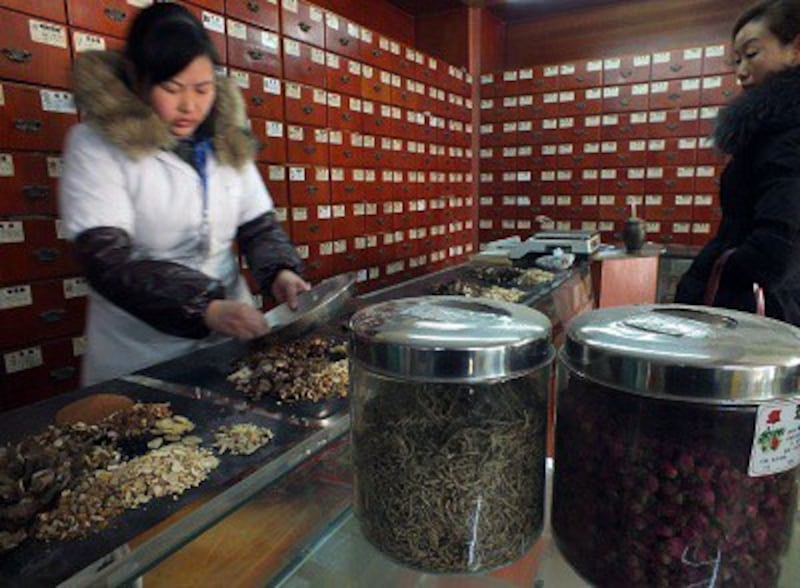Herbs used in traditional Chinese medicine and everyday cooking to boost health and cure ailments may pose long-term health risks through contamination with pesticides, an environmental group has warned.
While traditional Chinese herbs have a strong reputation for their medicinal benefits, with a growing international market worth at least U.S.$60 billion, many commercially grown herbs are now coated in a toxic cocktail of pesticide residues, the international group Greenpeace said in a new report.
The report titled "Chinese Herbs: Elixir of Health or Pesticides Cocktail?" found that 65 Chinese herbal products tested by Greenpeace scientists were coated in pesticide residues, including banned substances.
The group blamed the use of intensive agriculture methods to meet skyrocketing demand for alternative healthcare products.
Some of the pesticides found by Greenpeace are listed as "highly hazardous" by the World Health Organization (WHO), while others had residue levels that would breach European food safety standards.
Chronic pesticide poisoning can lead to learning difficulties, hormone disruption, and reproductive abnormalities.
"Greenpeace East Asia is urging the Chinese government to impose stricter supervision and control of illegal pesticides, provide clear pesticides reduction timelines, and commit to a road map to fully phase out chemical pesticides in agriculture," the group said in a statement on its official blog.

"We must walk this ecological path now to preserve the future of traditional herbal medicine," it said.
The group said it advocates the use of natural pest management techniques, rotation, and diverse cropping to ensure healthy, nutritious, and sufficient food for people while protecting the environment, water, and wildlife from toxic poisoning.
Zhengzhou-based environmental activist Cui Cheng said he was shocked at the findings, but that he believed they were reliable.
"I trust these figures that have been produced by Greenpeace," Cui said. "It actually means that our medicine is, in fact, poison."
"This will be terrifying for people."
Enforcing pesticide rules
Campaigners say that China has an exemplary set of environmental protection legislation, but that close ties between business and officials mean that it is rarely enforced at a local level.
Beijing University of Science and Technology economics professor Hu Xingdou said there are few incentives for Chinese farmers to stick to the law when raising lucrative crops, however.
Chinese officials are either apathetic about enforcing the rules on pesticides, or they form part of corrupt protection networks that shield their members from the law, he said.
"The punishments for this sort of thing aren't very severe in China," Hu said. "Also, 99.9 percent of people are being protected from them."
"It costs a lot to stick to the law, and very little to break it. There is very little enforcement capability."
Hard to regulate
Farming industry groups are either powerless or nonexistent in China, compared with their counterparts in developed countries, making herb-growers hard to regulate, Hu said.
"Agricultural associations are like a brand name under which people get together to produce and sell produce [in other countries]," he said. "None of that exists in China."
"Because of this, Chinese traditional herbs are all grown by small farmers as a private enterprise, making it extremely hard to regulate."
"Often, they will produce fake or shoddy goods, or foodstuffs and medicines that are actually poisonous, and it's very hard to trace who was responsible," Hu said.
Food safety scandals
Chinese consumers are reeling in the wake of a string of public health scandals affecting foodstuffs and medicines in recent years, including melamine-tainted infant formula milk, used "gutter" cooking oil, and tainted vaccines.
Last month, authorities in the southern province of Guangdong took the unprecedented step of naming rice producers whose products contained "excessive amounts" of cadmium, amid growing public pressure for transparency over the scandal.
Of 18 batches of rice tested during quarterly spot-checks, eight were found to contain excessive amounts of the carcinogenic heavy metal, the Global Times newspaper reported.
Worsening levels of air and water pollution, as well as disputes over the effects of heavy metals from mining and industry, have forced ordinary Chinese to become increasingly involved in environmental protection and protest, according to a 2013 report from the Friends of Nature group.
Many have been prompted into action by China's environmental crisis, sparking a rise in "mass incidents" linked to pollution, while environmental groups have raised growing concerns over the falsification of pollution testing and environmental impact assessments.
Reported by Yang Fan for RFA's Mandarin Service. Translated and written in English by Luisetta Mudie.

